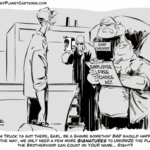Union Time, Taxpayer Dime: An Update


Stung by Janus, public-employee unions resort to thuggish tactics to discourage taxpayer challenges
An abridged version of this piece appeared in City Journal on November 20, 2018. The wheels of justice grind slowly. Here is a news story from the Austin American-Statesman, reporting on a court hearing on May 1, 2019.
For decades, public-employee unions have experienced explosive growth and exerted enormous political influence, even as their private-sector counterparts have declined in size and power. Public-sector unions critically depend on the ability to extract coerced payments from workers as a condition of their employment, but faced a setback this year when the U.S. Supreme Court ruled in Janus v. AFSCME that collecting mandatory “agency fees” from non-members is unconstitutional. Stung by the Janus decision, unions representing government employees desperately seek to discourage legal challenges to taxpayer subsidies, such as the little-known but widespread practice of putting union bosses on the government payroll.
When powerful unions feel threatened, they often resort to strong-arm tactics. Public safety employees, among the most heavily-unionized group of government workers, are no exception. Of this, I have first-hand knowledge.

Two years ago, I wrote in City Journal about a taxpayer lawsuit that had recently been filed in Travis County, Texas challenging the practice of “release time” in a contract between the city of Austin and the union representing the city’s firefighters, Austin Firefighters Association, Local 975. The lawsuit contends that a contractual provision requiring the city of Austin to pay up to 5,600 hours a year in “release time” to officers of AFA Local 975 to engage in union business constitutes a “gift of taxpayer funds” in violation of the Texas Constitution. (I am one of the plaintiffs in that case, represented by attorneys from the Phoenix-based Goldwater Institute and the Texas Public Policy Foundation.) The release-time practice, in Austin and elsewhere, costs Texas taxpayers upwards of $1 million each year.
So-called “release time,” “official time,” or “association business leave” provisions, common in public-employee union contracts (state and federal), allow government employees—who are also union officers—to receive their full salaries at taxpayer expense, even if they exclusively perform union business, including union politicking. Thus, taxpayers are compelled to finance the political efforts of union bosses—including lobbying and contract negotiation—whose interests are directly adverse to them. Most state constitutions—47 out of 50, according to one expert—bar payments of taxpayer funds yielding no public benefit, deeming them “gifts.” So far, the release-time practice has gone largely unchallenged, but unions are worried about losing another income stream if taxpayers successfully contest the practice.
The total amount of taxpayer subsidies of union payrolls (at the federal, state, and local levels) approaches $1 billion a year, according to some estimates. “Release time” is a lucrative gravy train for union bosses.
I believe that public-employee unions should pay the salaries of their officers with union dues, not taxpayer funds, and that “release time” violates the Texas Constitution. That is the basis for the pending lawsuit against AFA Local 975. Texas Attorney General Ken Paxton (R) has intervened in the case on the side of the plaintiffs (against the payment of “release time”), stating that the release-time practice serves no public purpose, provides no clear public benefit, and lacks adequate controls to protect the taxpayer. While the legality of “release time” under the Texas Constitution has never been adjudicated—making this a “test case”–Paxton’s position is consistent with a 1979 opinion issued by a prior Texas Attorney General, Mark White (D).
In 2011, the Goldwater Institute brought a similar challenge under the Arizona Constitution to a release-time provision in the contract between the city of Phoenix and the police union. After winning in the trial court and the intermediate court of appeals, in 2016 the challenge narrowly lost in the Arizona Supreme Court—by a 3-to-2 vote—when the newly-appointed Justice Clint Bolick (who had argued the case below while associated with the Goldwater Institute, prior to taking the bench) had to recuse himself and was fortuitously replaced by a judge who ruled in the union’s favor.
In light of the flukish “win” in Arizona, the unions are eager to stop the legal campaign against “release time” in other states before it gathers steam. The last thing they want is another Janus-type obstacle interfering with their access to lavish taxpayer subsidies. Unfortunately, two years after it was filed, the city of Austin case has not yet been decided; the parties have been occupied with extended procedural wrangling and pretrial discovery. AFA Local 975 has responded to the lawsuit aggressively, calling it a “union-busting move” and “a state-wide attack on all public sector employee groups, not just the AFA.”
When the AFA took my deposition recently in the pending lawsuit, I was expecting questions about the property and sales taxes I paid to the city of Austin—the basis for my “standing” as a taxpayer to challenge release time as a gift. Instead, the AFA’s lawyer asked me about my net worth, the amount of equity in my home, the value of my retirement plan, and other personal financial matters. (I was also asked about my City Journal article and other writings, on my blog and elsewhere.) One question in particular got my attention: “Are you aware that there’s a pending motion for attorneys’ fees and costs filed by the AFA seeking fees from you and your co-plaintiff in the case?” Coming from the AFA’s attorney, this ominous query was a thinly-disguised threat. Like a union enforcer wielding a cudgel, the menace was palpable: Drop this case or risk losing your house.

The AFA, you see, has filed a motion claiming more than $100,000 in attorneys’ fees and costs, plus “appropriately stringent” sanctions amounting to twice the attorneys’ fees sought. The AFA asserts that it is entitled to recover hundreds of thousands of dollars from the plaintiffs—including me–on the grounds that it is immune from lawsuit under the Texas Citizens Participation Act, an anti-SLAPP statute passed by the Texas legislature in 2011. SLAPP is an acronym for “Strategic Lawsuits against Public Participation,” which refers to a civil claim or counterclaim that attempts to infringe on a citizen’s right to speak freely, associate freely, and petition freely. Incredibly, the AFA–claiming to be the victim of a SLAPP suit–is using the TCPA to bully and intimidate an actual citizen exercising his rights under the Texas Constitution to challenge an unlawful taxpayer subsidy!
Even more incredibly, the AFA managed to convince the trial court to adopt this Through-the-Looking-Glass reading of the TCPA. Austin, the progressive capital city where the lawsuit is pending, is a friendly venue for labor unions. The AFA also contends that the Goldwater Institute is precluded from challenging release-time under the Texas Constitution because it did not prevail—for reasons that can only be considered freakish—in the Arizona case under another state’s constitution. This argument is laughable on its face.
According to the AFA, union bosses are protected by the TCPA, and entitled to be dismissed from taxpayer lawsuits challenging their actions. AFA Local 975, after having obtained such a dismissal from an obliging trial court judge (and incurring the claimed attorneys’ fees in the process), promptly re-entered the lawsuit as an intervenor to defend the release-time provision. The TCPA motion was simply a ruse to rack up unnecessary attorneys’ fees that could then be brandished as a threat against taxpayers displaying the temerity to challenge the release-time boondoggle.
Firefighters rightfully enjoy the public’s esteem and respect as first-responders who expose themselves to daunting workplace hazards—sometimes risking their lives. Unions representing government employees—public safety officers and otherwise—forfeit that goodwill when they engage in brazen threats against taxpayers in an attempt to bully challengers of unlawful subsidies. Such intimidation has no place in civil society. Threats of reprisal, whether made in a darkened alley or in a legal proceeding, are equally reprehensible.



































